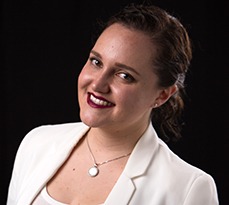A Master of Finance student at Cambridge Judge, Sharon Schlam (MFin 2021), seeks to inspire more women into the financial sector through her blog, The Fearless Girl of Wall St.

Sharon Schlam is currently studying for a Master of Finance (MFin 2021) degree at Cambridge Judge Business School. A native of Mexico, she worked as a finance and control analyst for Bank of America in Mexico City before coming to Cambridge this past autumn. In 2018 she launched a blog – The Fearless Girl of Wall St. – focused on supporting young women who seek to work in the financial sector. The name of the blog was inspired by a four-foot-high bronze statue in the Wall Street district of New York, named The Fearless Girl, that depicts a ponytailed young girl in a defiant hands-on-hips pose.
We caught up with Sharon to talk about the blog, her MFin studies, and diversity in the finance sector.
Q Why did you start writing the blog?
I was in Mexico when I started the blog. It was right after I graduated from college, and I started working for a private debt fund in Mexico City. When I was a college student, I always heard the same successful stories of older male colleagues. As I grew up, I realised how different and difficult a career in finance can be for a young woman, and how discouraging some situations can result when you don’t fully understand the gender gap. So I decided to share my own experiences with younger female colleagues to create awareness about industry dynamics so they don’t give up on their professional goals.
Q What are the biggest obstacles to achieving greater diversity in the finance sector?
I believe there are two main obstacles. The first one has to do with the industry itself: finance has always been ruled by men, and although younger generations are not as biased as before, we still need to change our mindset and stop thinking about gender roles in the workspace. However, no war has been won without an army and that’s the second biggest obstacle. There are not so many women wanting to pursue a career in finance; the women-to-men ratio is still very low. We will never achieve equality until we have at least a similar participation rate, so we need to encourage females to study finance and pursue careers in the sector.
Q You worked in finance in Mexico, but the blog has Wall Street in the title. Do you think that obstacles to finance diversity are similar all over the world, or are there national differences?
In terms of the finance sector, I am confident the obstacles are pretty much the same all over the world, however, each country has a different “structural problem” that supports those obstacles. The most developed countries in terms of gender equality in general have more potential of closing the gender gap in the finance sector sooner than those that have a lag. In the case of Mexico, there are cultural biases and threats a woman has to overcome for even thinking about pursuing a career in finance, while in countries such as the UK the process is more straightforward.
Q What has surprised you most in your first months in Cambridge, and about the MFin programme?
I am in love with Cambridge, so basically everything is surprising, but the most amazing part so far has been the city vibes. Cambridge is a city full of intellectual curiosity, people are always willing to learn, but also they are always willing to help – so basically the city is crowded with super smart and friendly people. Moreover, if you add the beautiful landscapes and all the traditions, Cambridge becomes the perfect place to study. Talking about the MFin programme, I am quite surprised by its diversity. When I came here, I knew that my classmates had very different professional backgrounds; however, as I get to know them better, I realise diversity goes far beyond nationality or professional experience. All the MFin students do finance, but sharing classrooms with former musicians, athletes, poets and entrepreneurs is helping me understand the world (and finance, of course) from a different perspective – and it is priceless.


